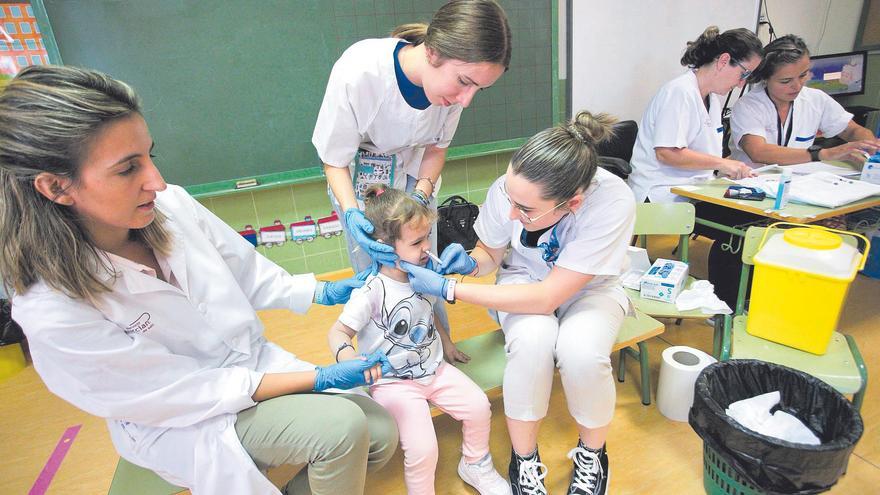Murcian families take vaccines seriously There is no doubt about it.Vaccination coverage for influenza and other respiratory viruses in recent years “Acceptable and hopeful”.Still, there is room for improvement and “increased involvement of family physicians, nurses, and primary care pediatricians” is needed to Year after year, more children get the flu vaccine.
Half of parents in Murcia region do not vaccinate their children against influenza They do it because their pediatrician advises against it or because they do not have the necessary information about immunization campaigns.
This is reflected in one of the main conclusions drawn from the first part. “Flutra” researchPrepared by professionals from the Health Prevention and Protection Services Program of the Ministry of Health’s Vaccination Program During the 2022-2023 campaign It analyzes the influenza vaccination status of children under five years of age in Murcia, the probability of parents vaccinating their children, and a comparison of the profiles of parents who vaccinate and do not vaccinate their children.
The first results of the recently published study have come to light and confirm that “the clinical background of parents and children has a decisive role in vaccination decisions, especially the parents’ previous and current vaccination status.”
Therefore, this important research was participated and evaluated by a number of 10,000 parents and legal representatives of minors, approximately 4,970 of whom said they had vaccinated their children against influenza More than 5,000 people admitted they failed to do so.
One of the main reasons given in the survey for not vaccinating minors is that health professionals do not recommend vaccination (31% for infants 6 to 23 months; 31% for children 24 to 59 months) , this proportion is 17.9%). “Lack of information about vaccines” also gained weight (by 21.5% and 15% respectively), and “They would rather wait until they have more experience with the flu vaccine before getting it” (nearly 18% and 22% respectively).
“Flutra” study confirms that only 1% of respondents in the region do not believe in vaccines
to protect them
On the other hand, when asked why they decided to vaccinate their children, the most repeated answer from both groups of parents was “to protect the child”, with the proportion in the first group being significantly higher (89.4% vs. 85.9%). Other reasons for vaccination include “on the recommendation of a pediatrician or doctor” (both 44.3%), “to protect other family members” (21.3% vs. 32.6%) or “due to inclusion in a vaccination program” (24.4% vs. 24.7% ).
In this sense, the study states that the most cited sources of information about influenza vaccination campaigns are Pediatrician or nurse recommendation.
All this data will help Ministry of Health professionals further encourage families to participate in upcoming vaccination campaigns against these respiratory viruses. Jaime Pérez, President of the Spanish Vaccinology Association and Deputy Director of the Department of Prevention, Health Promotion and Addiction The Ministry of Health confirms that the current 2023/2024 campaign increasingly takes all of these issues into account.
Rotavirus immunity, the wait begins
Following the success of the 2023/2024 campaign to vaccinate newborns and infants against bronchiolitis, the Ministry of Health now hopes to do the same with the rotavirus vaccine. Jaime Pérez confirmed that the region is in the “final stages” of starting vaccinations in minors in the first half of the year against the virus, which is the main cause of severe diarrhea in infants and can also cause vomiting, fever and dehydration .
Given the data, Perez reminded The View that “it’s important to remember that maybe in this campaign Some people don’t even ask their health professional for this possibility.
lack of awareness
“More awareness is needed,” he said. “We must work harder to raise awareness among more and more professionals and educate families about the importance of the vaccine.”
The president of the Spanish Vaccinology Association also emphasized here that about 10% of parents of children aged 24 to 59 months said that they were unable to vaccinate their children because they believed that vaccination was not easy.
“Therefore, in the current campaign, influenza vaccination has been launched in schools to make it easier for parents to get vaccinated.” In fact, the preventive medicine and public health expert added, “The survey results have also been taken into account to ensure more Good vaccination coverage.”
Few people deny
return Matilde Zornoza, pediatrician at the Vaccine Service Officials from the Ministry of Health remember that last season 2022-2023, this community, together with Andalusia and Galicia, was one of the three communities that started vaccinating children under 5 years old against influenza.Perez remembers that despite Murcia was a pioneer in vaccinating minors; other European countries, the United Kingdom and the United States had implemented it years ago..
Finally, Jaime Pérez highlighted the low level of “anti-vaccination” in the region: only 1% of parents surveyed who did not vaccinate their children attributed this to a lack of belief in the beneficial effect of vaccines on health protection: “This is A very positive fact” as this is a “problem” that “fortunately” will not have a major impact on the area.
High satisfaction
Data from the study showed that parents who received the flu vaccine “vaccinated their children five times more often than parents who did not receive the flu vaccine.” The study also found that those with a more complete vaccination schedule were 3.5 times more likely to get a flu shot.
They form part of the conclusions of the work of the Ministry of Health’s public health and vaccine teams. Jaime Pérez emphasized that the “satisfaction” of parents after deciding to vaccinate their children is also “very important”.
Nearly 70% of respondents were “very satisfied” with vaccination, and nearly 30% were “fairly satisfied.” Only about 2% of all households in the study were dissatisfied with vaccination.

